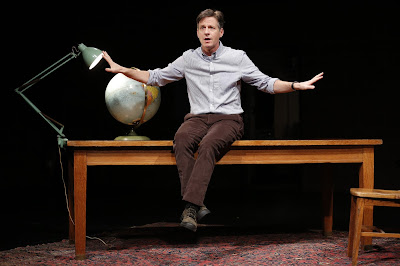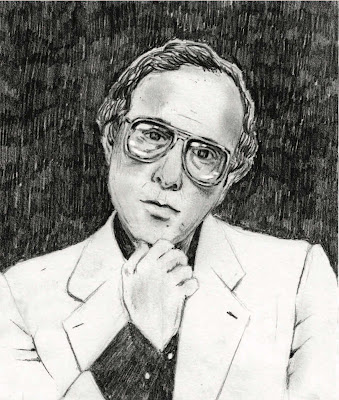Finding Humanity in Our Brokenness: An Interview with Martin Moran
By Simon Hodgson
Growing up in 1970s Denver, teenager Martin Moran looked like a poster boy for Catholic school—a kid with good grades, clean fingernails, and a smile for everyone on his paper route. Inside, however, Moran was grappling with the conflicting shame and thrill of a relationship with his male 30-year-old camp counselor, Bob.
“Sometimes I felt scared and I liked it,” Moran says in his memoir, The Tricky Part. “All the concealment was a kind of strange power. An entire and buzzing inner life. A fourteen-year-old boy on a three-speed Raleigh, getting it every which way. I was getting away with murder, with pleasure, with crimes, and I was pulling A’s.”
Moran went on to become a successful actor, with Broadway credits including Spamalot and Cabaret, and television appearances on The Newsroom and Law & Order. He is also a writer, whose OBIE Award–winning show The Tricky Part (based on his memoir) describes coming to terms with his relationship with Bob, his own journey as a young gay man, and his discovery of theater.
All the Rage, Moran’s Lucille Lortel Award–winning follow-up show, originated in a question he heard from Tricky Part audiences—shouldn’t he feel more anger about what he experienced as a boy? All the Rage follows Moran from Las Vegas to South Africa as he’s haunted by ideas about compassion, forgiveness, and fury. As The Strand Theater prepares for All the Rage and The Tricky Part, we caught up with the actor and writer for a quick Q&A.
What kinds of reactions have you got to All the Rage and The Tricky Part?
I recently performed the two plays on a three-city tour of India, where there was a kind of gobsmacked reaction at both the frankness and the form: one guy standing onstage talking about sensitive social issues, like trespass, molestation, forgiveness. In Red Bank, New Jersey—a very Catholic community just outside of New York City—there were people who got up and left. The reactions have been profound, and have differed by locale. But the more I tell the stories, the more I realize they are less about me and more about universal questions: How do we survive what we think of as damage? How do we find the humor and the humanity in our brokenness?
You’ve been performing these two stories, in various forms, for several years now. How has your perspective on them shifted?
Initially, the writing and performing invoked a great sense of shame. I used to get nauseous before doing The Tricky Part. I’d sit backstage and think, “What the fuck am I doing? This stuff is too intimate.” Now, I feel less a sense of owning the story in a personal way, and I revel in the humanness of it instead. It feels like a quest that’s of service, that’s unifying, and even joyous.
One of the most compelling aspects of The Tricky Part is how you handle the complexity of the human experience.
I feel devoted to complexity. It is within the paradoxes of life that we have a chance at grasping flashes of human truth and beauty. We are so full of love. And cruelty, too. Look at us now, amid this election season, so anxious about the seeming hate and division. But we do look to one another in quiet ways, don't we? Over a meal, in a book, perhaps in an evening of theater, to be reminded that we are all in this together. When I was 12, the violence of what happened was so painful, the complexity overwhelming. Thanks be that I lived, and how odd that everything that happened became a source of knowledge and empathy.
The Tricky Part and All the Rage open tonight and run through December 11 at The Strand Theater, 1127 Market Street, San Francisco. Click here to purchase tickets through our website.
Growing up in 1970s Denver, teenager Martin Moran looked like a poster boy for Catholic school—a kid with good grades, clean fingernails, and a smile for everyone on his paper route. Inside, however, Moran was grappling with the conflicting shame and thrill of a relationship with his male 30-year-old camp counselor, Bob.
“Sometimes I felt scared and I liked it,” Moran says in his memoir, The Tricky Part. “All the concealment was a kind of strange power. An entire and buzzing inner life. A fourteen-year-old boy on a three-speed Raleigh, getting it every which way. I was getting away with murder, with pleasure, with crimes, and I was pulling A’s.”
 |
| Martin Moran in All the Rage. Photo by Joan Marcus. |
All the Rage, Moran’s Lucille Lortel Award–winning follow-up show, originated in a question he heard from Tricky Part audiences—shouldn’t he feel more anger about what he experienced as a boy? All the Rage follows Moran from Las Vegas to South Africa as he’s haunted by ideas about compassion, forgiveness, and fury. As The Strand Theater prepares for All the Rage and The Tricky Part, we caught up with the actor and writer for a quick Q&A.
What kinds of reactions have you got to All the Rage and The Tricky Part?
I recently performed the two plays on a three-city tour of India, where there was a kind of gobsmacked reaction at both the frankness and the form: one guy standing onstage talking about sensitive social issues, like trespass, molestation, forgiveness. In Red Bank, New Jersey—a very Catholic community just outside of New York City—there were people who got up and left. The reactions have been profound, and have differed by locale. But the more I tell the stories, the more I realize they are less about me and more about universal questions: How do we survive what we think of as damage? How do we find the humor and the humanity in our brokenness?
You’ve been performing these two stories, in various forms, for several years now. How has your perspective on them shifted?
Initially, the writing and performing invoked a great sense of shame. I used to get nauseous before doing The Tricky Part. I’d sit backstage and think, “What the fuck am I doing? This stuff is too intimate.” Now, I feel less a sense of owning the story in a personal way, and I revel in the humanness of it instead. It feels like a quest that’s of service, that’s unifying, and even joyous.
One of the most compelling aspects of The Tricky Part is how you handle the complexity of the human experience.
I feel devoted to complexity. It is within the paradoxes of life that we have a chance at grasping flashes of human truth and beauty. We are so full of love. And cruelty, too. Look at us now, amid this election season, so anxious about the seeming hate and division. But we do look to one another in quiet ways, don't we? Over a meal, in a book, perhaps in an evening of theater, to be reminded that we are all in this together. When I was 12, the violence of what happened was so painful, the complexity overwhelming. Thanks be that I lived, and how odd that everything that happened became a source of knowledge and empathy.
The Tricky Part and All the Rage open tonight and run through December 11 at The Strand Theater, 1127 Market Street, San Francisco. Click here to purchase tickets through our website.


